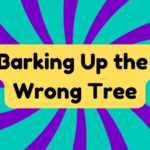"Bark up the wrong tree" means to pursue a mistaken or misguided effort, often leading to wasteful outcomes. It originates from early American hunting, where dogs barked at trees thinking their prey was hidden inside. This expression highlights the importance of accurate judgment in both personal and professional situations, as misdirected efforts can cause confusion and inefficiency. Understanding this phrase can enhance communication skills, prompting a reassessment of one's approach to various challenges. More insights await those who explore further.
Synonyms
When exploring the idiom "bark up the wrong tree," it becomes evident that there are several synonyms that convey similar meanings. These alternatives highlight various aspects of misguided efforts and incorrect assumptions:
- Chasing shadows – Suggests pursuing something unattainable or illusory.
- Going in circles – Implies wasting time without real progress or resolution.
- Misguided quest – Highlights the futility in seeking a goal based on false premises.
Recognizing these synonyms encourages a deeper understanding of the idiom. Their use can illuminate common situations where one might fail to see the reality, ultimately leading to unproductive attempts and wasted energy.
Example of Sentences
Exploring idiomatic expressions like "bark up the wrong tree" can often shed light on human tendencies to misjudge situations. This phrase illustrates several common scenarios of misguided pursuits:
- Investigators spent months barking up the wrong tree in a sensitive case.
- Following those flawed steps, one is clearly barking up the wrong tree.
- Accusations against someone were simply barking up the wrong tree, as misunderstandings clarified their innocence.
These examples serve as cautionary tales, urging individuals to reassess their approaches. Misguided efforts lead to unnecessary confusion and inefficiency, highlighting the need for clearer communication in maneuvering complex circumstances.
Origin
The origins of the phrase "bark up the wrong tree" can be traced back to early American hunting practices, specifically involving dogs and their pursuit of prey. These dogs would often mistakenly bark at a tree, believing their quarry was hidden within. This imagery illustrates not just a literal misdirection but has evolved into an idiomatic expression. Its cultural significance reflects a shared understanding of human errors and the potential for misguided efforts. Over time, the phrase has undergone idiomatic evolution, becoming a staple in discussions about missteps—highlighting the importance of directed focus in both communication and action.
Collocations
Collocations associated with the phrase "bark up the wrong tree" are essential for understanding its usage in various contexts. Recognizing these phrases can illuminate the significance of misguided efforts and wrong assumptions. Consider the following:
- Pursuing misguided efforts leads to unproductive outcomes.
- Addressing wrong assumptions fosters misinterpretations in communication.
- Engaging in misplaced actions exacerbates the initial dilemma.
These collocations provide clarity and depth to the expression, encouraging a critical view of how language shapes perception. Without this understanding, individuals risk perpetuating mistakes, ultimately hindering effective communication and productive dialogue in innovation-driven environments.
How to Use in Everyday Language
Using the phrase "bark up the wrong tree" in everyday language can effectively convey when someone is making a mistake or misdirecting their efforts. Common misconceptions arise when individuals misunderstand its intent, thinking it solely applies to serious errors. In various usage scenarios, from workplace discussions to casual conversations, this idiom highlights flawed approaches. For instance, suggesting a colleague is barking up the wrong tree during a project can prompt reevaluation. However, care should be taken to avoid overuse, as it may diminish its impact, rendering it less effective in pointing out misguided pursuits.
Why Is It Still Relevant Today?
Even though language evolves constantly, the phrase "bark up the wrong tree" remains pertinent in contemporary discussions. Its cultural significance endures, reflecting humanity's persistent pitfalls in judgment. In an age driven by innovation and instantaneous decisions, misdirection can lead organizations astray. Modern applications of the phrase resonate particularly in business and technology, where misguided strategies can result in significant setbacks. Recognizing when one is barking up the wrong tree encourages critical thinking and fosters better decision-making. By studying this idiom, individuals can cultivate awareness of their own assumptions and avoid the common trap of chasing inappropriate or ineffective paths in their pursuits.







